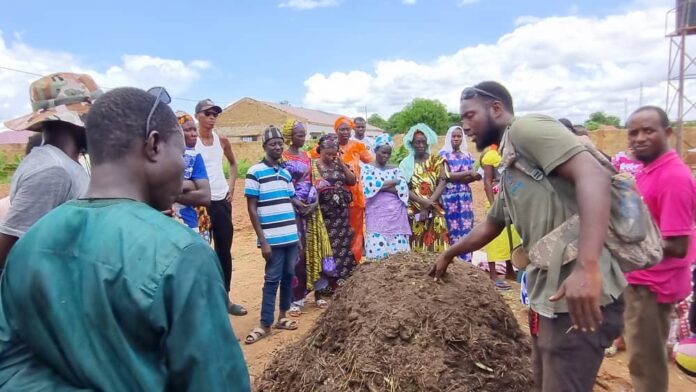Written by: Alieu Jallow
Smallholder farmers in the North Bank and Central River Regions of The Gambia are calling for a nationwide shift from artificial fertilisers to natural compost, citing negative impacts on soil health and crop yield. The call was made during a three-day capacity-building training organised by ActionAid International The Gambia (AAITG) under the SAPOF Project, which aims to promote agroecology and climate resilience among small-scale farmers.
The training, which focused on compost manufacturing, attracted dozens of rural farmers, including persons with disabilities, who are eager to adopt more sustainable farming practices in the face of climate-related challenges and declining soil fertility. Farmers expressed concern that the continued use of synthetic fertilisers has led to poor harvests and deteriorating soil conditions, threatening food security and rural livelihoods.
Ndella Dampha, a gardener from Conteh Kunda Niggie and a beneficiary of the training, shared her personal experience with The Fatu Network.
“NPK fertilisers push the crops to grow fast, but the yield is disappointing. After some time, the leaves turn yellow, fruits shrink, and sometimes rot in the soil. But with compost, my crops are greener, healthier, and pest-free. This year, I harvested 20 bags of onions compared to just 10 in previous years,” she explained.
Sheriff Secka, a person living with a disability and also a participant, echoed similar concerns. He noted that overreliance on artificial fertilisers had exhausted the soil in their village garden, which has not produced a bumper harvest in years.
“We’ve cultivated that garden for long, but artificial fertilisers have done more harm than good. Now that we have acquired compost-making skills, we ask the government to support us with materials, especially a tricycle to transport our compost. Despite our disabilities, we still farm to survive,” he said.
Tata Suko from Niamina Misera in the Central River Region also conducted a comparative experiment using both artificial and organic fertilisers.
“The results are clear. The compost-fed crops are healthier and yield more. The government should support us by building compost pits in our women’s garden so rain doesn’t wash away our hard work,” she appealed.
This growing shift in perspective among rural farmers underscores the importance of integrating traditional, sustainable farming practices into national agricultural policies. According to ActionAid, the training forms part of a broader agenda to build the resilience of smallholder farmers amid climate threats, unsustainable land use, and food insecurity.
As climate change continues to pressure agricultural communities, these farmers are advocating for a return to nature—proving that agroecology is not only possible but essential for sustainability, food security, and health.




